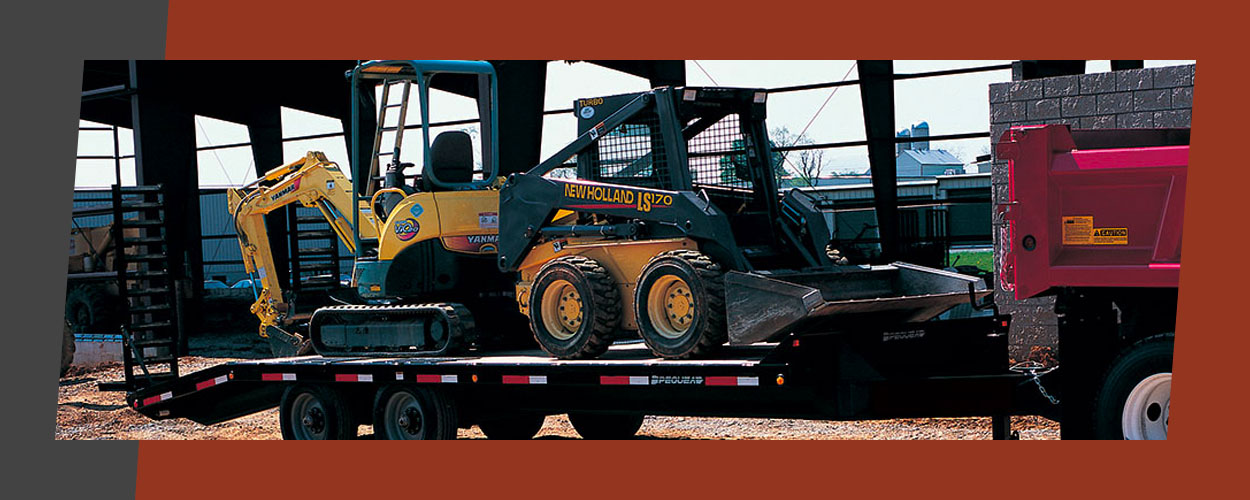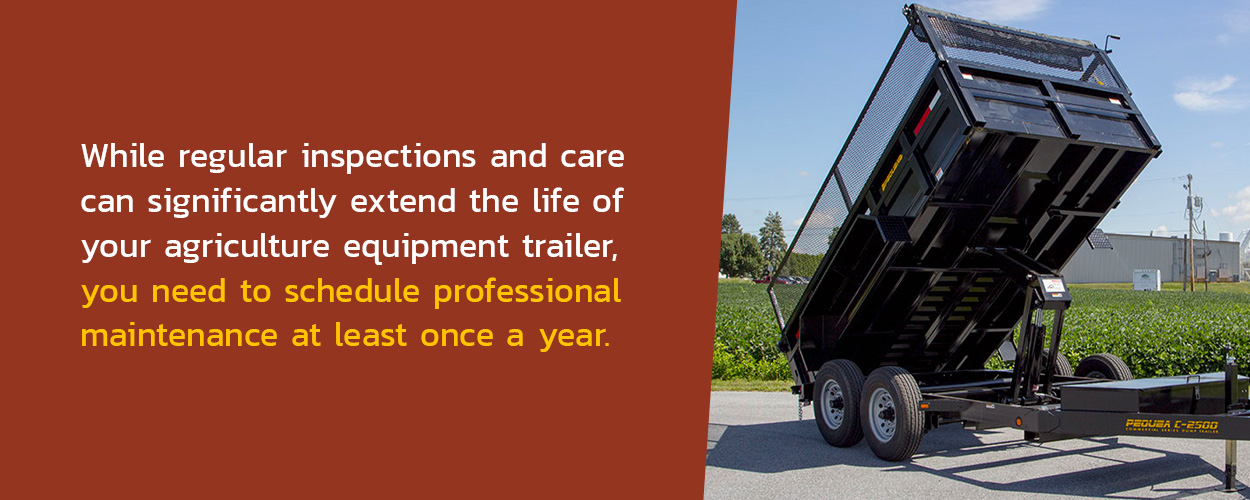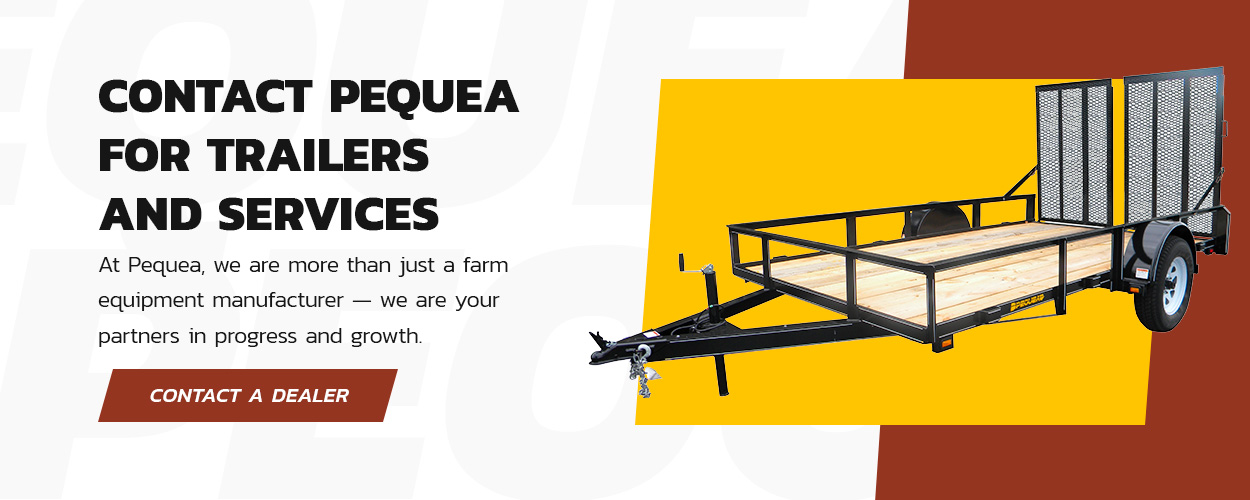Trailer Safety Tips for Hauling Agriculture Equipment

Safety is an unwavering priority for every farmer when hauling agricultural equipment. The sight of tractors, hay rakes and lime spreaders traversing public roads is a common one, but it is essential to remember that the journey carries inherent risks that demand careful attention.
In this article, we delve into equipment security during transport. Let us explore why taking the time to fasten and maintain your equipment properly can make a world of difference in the success of your agricultural operations and the safety of everyone on the road.
Trailer Maintenance and Care
Neglecting the upkeep of your trailer not only poses a risk to your valuable equipment but also jeopardizes your safety and the safety of others on the road. We've compiled these essential trailer maintenance and care tips to help you maintain a dependable and secure hauling experience.
- Regular inspections: Pay special attention to the tires, brakes, suspension system, hitch and lights. Identifying and addressing potential issues proactively can save you from costly breakdowns or accidents down the road.
- Tire care: Make it a habit to inspect tire pressure and tread depth before each trip. Underinflated or worn-out tires can lead to blowouts or decreased handling performance. Additionally, ensure that the lug nuts are tightened to the manufacturer's specifications to avoid wheel separation during transit.
- Lubrication and greasing: Regularly lubricate the bearings, hinges and other mechanical components per the manufacturer's recommendations. This will reduce friction, prevent excessive wear and enhance the overall functionality of your trailer.
- Electrical system: Ensure that all electrical connections, such as lights and brake controllers, work correctly before each trip. Keep your electrical system in tip-top shape to remain visible and communicate with other drivers on the road.
- Cleaning and rust prevention: Agricultural equipment can introduce corrosive elements to your trailer, making rust prevention a maintenance aspect. After each use, thoroughly clean the trailer, especially the undercarriage, to remove mud, debris and chemicals that could accelerate corrosion. Consider applying a protective coating or paint to vulnerable areas to shield them from the elements.
- Proper loading and weight distribution: Overloading your agriculture equipment trailer can lead to structural damage, increased tire wear and compromised braking efficiency. Always adhere to the manufacturer's weight limits and distribute the load evenly to maintain proper balance and stability during transportation.
- Storage: Store your trailer in a dry, covered space when not in use. If outdoor storage is unavoidable, consider using a weather-resistant cover to protect your trailer from rain, snow and UV rays.
- Professional maintenance: While regular inspections and care can significantly extend the life of your agriculture equipment trailer, you need to schedule professional maintenance at least once a year. A qualified mechanic can thoroughly assess and address any underlying issues and ensure your trailer complies with safety standards.
Make Sure Your Motor Vehicle Is Ready to Go

Properly equipping your vehicle is not just about convenience — it directly impacts the safety of your equipment, your cargo and everyone sharing the road with you. Before hitching up your agriculture equipment trailer, follow these vital steps to ensure your motor vehicle is ready.
- Check the towing capacity: First and foremost, confirm that your motor vehicle has the appropriate towing capacity to handle the weight of your agriculture equipment trailer and the load it will be carrying. Consult your vehicle's owner's manual or contact the manufacturer to determine the maximum towing capacity.
- Install the right hitch: Different trailer types and sizes require specific hitches to ensure a secure connection between the vehicle and the trailer. Investing in a high-quality hitch that matches your agriculture equipment trailer's requirements will offer better stability and control while towing.
- Braking system: Consider installing an auxiliary braking system on your motor vehicle for larger and heavier agriculture equipment trailers. These systems can significantly improve braking performance and reduce the risk of accidents, especially when hauling sizeable equipment or navigating steep terrain. Ensure the braking system is correctly adjusted and synchronized with your trailer to guarantee optimal efficiency.
- Suspension and shocks: Your motor vehicle's suspension system maintains stability while towing, so be sure to check the suspension components and shocks for any signs of wear or damage.
- Transmission cooling: If your motor vehicle lacks factory-installed transmission cooling, consider adding an aftermarket transmission cooler to prevent excessive heat buildup and ensure smooth operation during long journeys.
- Tire maintenance: Examine your motor vehicle's tires to ensure they are in good condition, properly inflated and suitable for towing. Tires with insufficient tread or incorrect pressure can compromise stability, steering and braking capabilities. Consider investing in high-quality, load-rated tires designed for towing purposes to enhance safety precautions and performance.
- Electrical and lighting: Ensure all electrical connections between your motor vehicle and the agriculture equipment trailer are correctly working. This includes brake lights, turn signals and hazard lights.
Transporting Equipment on Public Roads
Transporting your valuable agricultural equipment on public roads requires careful planning, adherence to legal regulations and a heightened sense of responsibility. As a farmer, prioritize safety for yourself and other road users. Before you embark on your journey, familiarize yourself with the following essential considerations when transporting equipment on public roads.
- Obtain necessary permits: Before hauling your agriculture equipment on public roads, check with local authorities to determine if any special permits or licenses are required. Oversized or overweight loads often demand additional permits to ensure compliance with road safety standards.
- Know weight and size limits: Exceeding weight and size restrictions can pose a significant risk to your vehicle's stability and braking capabilities. Moreover, it can cause structural damage to roads and bridges, potentially leading to accidents or legal consequences. Always consult local transportation authorities or your country's transportation department to stay within legal limits.
- Properly secure the load: Use high-quality straps, chains and binders to secure the load firmly to the trailer. Double-check all attachments before hitting the road and periodically inspect them during the journey to ensure everything remains tightly fastened.
- Display proper signage: Enhance visibility on the road by using reflective signs and flags on your agriculture equipment trailer. The signs should indicate the presence of an oversized load and warn other drivers to exercise caution when approaching or overtaking your vehicle.
Contact Pequea for Trailers and Services
At Pequea, we take immense pride in being a family-owned since 1970. As farmers ourselves, we understand the dedication, smart thinking and commitment it takes to succeed in the field. The valuable insights and feedback from farmers like you inspire us to continually produce newer, better agricultural products that meet your evolving needs.
Our diverse range of products, including deckover trailers, skid steer trailers, tilt and dump trailers and gooseneck trailers, are carefully crafted with industry-leading designs and top-notch performance. Each product is a testament to our commitment to excellence and reliability.
- Deckover trailers: Standard duty pequea deckover trailers come in various configurations, ensuring you have a reliable performer for any hauling requirement. Whether you need to transport 10,000 or 14,000 pounds, we have the perfect fit for your needs, with useful features like ramps for added convenience.
- Skid steer trailers: Our Pequea skid steer trailers are ideal for safely transporting construction equipment. They make loading and unloading a breeze, ensuring your valuable equipment remains protected during transit.
- Tilt deck and dump trailers: When it comes to versatility, Pequea tilt deck and dump trailers excel at handling various tasks. From easily hauling wider equipment to conveniently dumping loads out the rear gate, these trailers are perfect for landscaping or construction operations.
For more information on our products and to explore our inventory, we invite you to download our brochure or contact one of our representatives. At Pequea, we are more than just a farm equipment manufacturer — we are your partners in progress and growth. Together, let's continue to shape the future of farming with smarter solutions and cutting-edge equipment.
